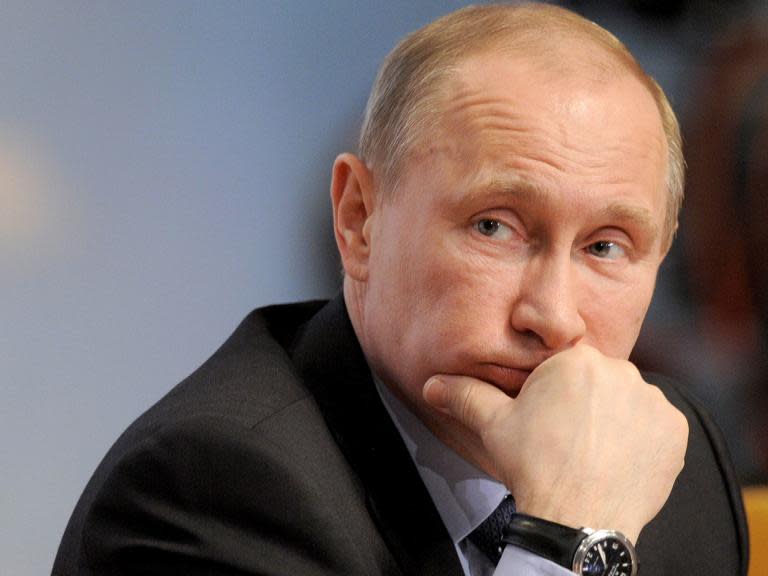Russia claims Mueller report vindicates what it ‘knew all along’ about Trump’s relationship with Moscow
The Kremlin turned to a Chinese proverb on Monday to express satisfaction with the outcome of Robert Mueller’s 22-month investigation.
According to Kremlin spokesperson Dmitry Peskov, the report’s main findings – that there was no evidence of collusion between Moscow and the Trump team – had vindicated what Russia knew all along.
“It’s hard to find a black cat in a black room,” he told reporters. “Especially if there isn’t one.”
Mr Peskov’s words mirrored earlier comments made by the Alexei Pushkov, a member of Russia’s upper house. “There is no black cat,” he wrote on Twitter. “US Democrats, Russophobia, and leading media have created a virtual conspiracy – in their heads and on the front pages but nowhere else.”
The Mueller investigation dominated Russian news bulletins on Monday.
The rolling state news channel presented immediate reaction from Natalya Veselnitskaya, the Russian lawyer indicted by Mr Mueller in January with obstruction of justice charges. She described the published résumé of the report as a “bombshell”, but did not expect it to make a real impact in her own case.
Lunchtime talk shows hit a more triumphalist note, with the flagship Time will tell demanding the US now show contrition.
“The ball is now in their court,” said presenter Artyom Sheinin, “but perhaps it’s too late.”
The comprehensive coverage marked a major change in editorial priorities. In recent weeks, Russian media has avoided discussion of the Mueller investigation almost as obsessively as the US media has followed it.
Part of that, undoubtedly, was a conscious decision, with channels taking a lead from official Kremlin statements relegating the investigation to the “undeserving of comment” box. Taking a similar approach to its dealings with Aleksey Navalny – the opposition politician never referred to by name – the Kremlin had repeatedly made it clear it wouldn’t discuss a report investigating foreign interference since that was “something Russia never does”.
But the rejection of the Mueller process and the hype around it actually went well beyond the usual loyalist circles. Indeed, the two-year investigation did a very rare thing in Russia: unified the state and the pro-western opposition against the United States.
Alexei Kovalev, a campaigning journalist and founder of a blog tackling fake news, said months of coverage undermined the faith Russians once had in American institutions. They could no longer trust the once-revered media, he said, because it had “abandoned standards and taken sides in an ideological fight”.
Russians have been turned off by the absurd “xenophobia” which has crept into the US coverage of the investigation. Mr Kovalev said: “We were told Melania was a Russian agent because she was born in Soviet Yugoslavia. Then were told Felix Sater [a Trump associate] tried to bribe Putin with a penthouse in Trump Tower. All the time, us Russians have been depicted as dirty, stupid, hammer and sickle people.”
Independent analyst Masha Lipman, another close observer of Russian and American media, agreed that Russians were turned off the Mueller investigation without the help of state propaganda.
“Even in America, one in two saw the process as a witch hunt,” she said. “When you have that polarisation within America, and add in the apathy that occurs after two years of leaking, and the lack of indisputable evidence linking Russia to Trump’s team, it’s quite natural that Russians saw this as an all-American affair.”
Loyalist voices suggested that the better-than-expected culmination of Mr Mueller’s probe provided an opportunity to turn the page and “reset” frayed relations.
The time was now right to revisit negotiations on nuclear arms treaties, said Konstantin Kosachev, chair of the foreign affairs committee of Russia’s upper house: “We are ready … Whether Trump is ready is another question.”
But others suggested the die was already cast – and an age of confrontation beckons.
Sergei Karaganov, a prominent foreign policy analyst considered close to the Kremlin, told The Independent that Russia and the west remained “rivals” set on different paths.
Russia was on the “rising tide of history”, he said, and the west would regret its decision to exclude the military superpower from its orbit: “We wanted to be part of the west, but were rejected, and I have to admit I was worried about our fate. But now we watch the west decline, while we are growing.”
Mr Karaganov said the west’s aggressive policies in the 1990s meant most Russians actually considered interference in US affairs legitimate.
“My own view is we didn’t interfere much, and probably should have done better,” he said. “If anything, it was an educational process, teaching our partners to behave properly.”

 Yahoo News
Yahoo News 

